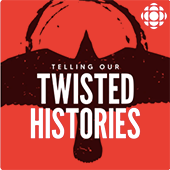Bill Hader proves he's the best podcast guest ever on Mike Birbiglia's Working It Out
Plus, Whitney Cummings goes for broke with a four-hour episode of Good For You

Blindspot: Tulsa Burning
The Rise of Greenwood
James Baldwin famously wrote, “Not everything that is faced can be changed, but nothing can change until it is faced.” Blindspot: Tulsa Burning, produced by WNYC and The History Channel, provides a valuable opportunity to look back in order to look forward. The series illuminates everything you might not have been taught in history class about the resettlement of Tulsa, Oklahoma, and the revolutionary Black community of Greenwood, known as Black Wall Street. This episode explores the events that led to the eventual leveling of the town by white supremacists. As presented, the destruction of the town wasn’t just a moment, but a long game, likened to chess, as land that had been written off was suddenly found to be rich in oil. If you, too, had a dubious one-page history book description of the Trail of Tears, or maybe didn’t know that Tulsa was a contender against Middle Eastern oil, or perhaps wonder why Black descendants didn’t pass down knowledge of these events, this episode is going to have you like “WTF, I know nothing.” [Morgan McNaught]
Good For You
Mark Normand & Yannis Pappas
Whitney Cummings has been holding lengthy convos with many of her comedian pals on her podcast for over a year and a half now, with most episodes running almost three hours long. But she went the distance for this ep, which clocks in at four hours and 19 minutes. Cummings starts the show getting to know Mark Normand, who has already mastered the fine art of serving up smart-assed quips. But when cantankerous Todd Glass soundalike Yannis Pappas shows up at the 42-minute mark, that’s when the show becomes a marathon ball-busting and tea-spilling session. (That last part is both figurative and literal; Cummings pulls out spiked kombucha for her and the boys after the first 90 minutes.) These three do spend most of the episode intensely discussing the current state of stand-up, particularly on what comics can and can’t say on the mic now. Cummings even runs down a long list of terms and sayings people might take umbrage with due to their offensive origins. [Craig D. Lindsey]
Mike Birbiglia’s Working It Out
Bill Hader: This Episode Has It All
One of the pleasures of Mike Birbiglia’s Working It Out has always been how the comic manages to get his guests to reflect back on the process of creating their art, revealing the often messy strategies required to come up with good material in ways that showcase the vulnerable side of comedians and actors. These conversations hit a high point with latest guest Bill Hader, who happily discusses the ways his own creative weak points have led him to continually search out new ways to evolve and learn as both a writer and performer (to say nothing of his work behind the camera, as well), such as the fact that he took the job as a writer on South Park because he realized he simply didn’t know how to deliver a good script. Add to those kinds of open-hearted confessions the incredible gift for delightful anecdotes and funny asides that Hader possesses (he cracks up recalling a particularly good burn Birbiglia once delivered to a tardy Pete Holmes), and you’ve got the Platonic ideal of a how-the-sausage-gets-made comedy podcast. [Alex McLevy]
Telling Our Twisted Histories
SCHOOL
The word “school” has many meanings, but for generations of Indigenous people, school meant the deliberate destruction of their culture. Telling Our Twisted Histories is a CBC podcast hosted by Kaniehtiio Horn (Letterkenny) that explores the words and concepts used by the western world to colonize Indigenous minds. This episode examines the legacy of Canada’s Indian Residential Schools whose stated goal was to “kill the Indian in the child.” These schools would forcibly remove children from their tribes, forbid them from speaking their own languages, and actively cut the thread between them and their heritage. The last of these schools closed in 1996 and through interviews with many First Nation, Inuit, and Métis survivors of this system, a damning and complex picture is formed. What stands out is the survivors’ descriptions of their parents’ conflicted feelings on these schools. Parents knew their children were being assimilated away from their family teachings and beliefs, but they also recognized that without an education they would have no future. Those interviewed reflect that the promise of a future is not worth the loss of the past. It’s a sobering look at a shameful history whose crimes are still being unearthed. [Anthony D Herrera]